MH Board Class 10 English (17-N-581) Question Paper 2024 PDF is available for download here. The total marks for the theory paper are 70. Students reported the paper to be easy to moderate.
MH Board Class 10 English (17-N-581) Question Paper 2024 with Solutions
| MH Board Class 10 English (17-N-581) Question Paper 2024 with Answer Key | Download | Check Solutions |

li_ht
View Solution
The complete word is light. Quick Tip: Light refers to the natural agent that makes things visible.
f_cus
View Solution
The complete word is focus. Quick Tip: Focus refers to the center of attention or activity.
hab_t
View Solution
The complete word is habit. Quick Tip: A habit is a regular practice or routine.
sti_k
View Solution
The complete word is stick. Quick Tip: A stick is a thin piece of wood or material, often used for support or as a tool.
trees, birds, garden, rose
View Solution
The words in alphabetical order are: birds, garden, rose, trees. Quick Tip: When arranging words alphabetically, compare the first letter of each word and proceed to the next letter if needed.
truth, trouble, test, treatment
View Solution
The words in alphabetical order are: test, treatment, trouble, truth. Quick Tip: Start by comparing the first letter of each word, and if they are the same, move to the next letter to decide the order.
she cried are you crazy
View Solution
The punctuated sentence is: She cried, "Are you crazy?". Quick Tip: Remember to capitalize the first word of a sentence and add appropriate punctuation marks, such as commas and question marks.
the teacher said lets start todays lesson
View Solution
The punctuated sentence is: The teacher said, "Let's start today's lesson.". Quick Tip: Use apostrophes for contractions like "Let's" and for possessives like "today's". Also, ensure the sentence starts with a capital letter.
Make four words (minimum of three letters each) using the letters in the word:
Advertisement
View Solution
Here are four possible words using the letters in "Advertisement":
1. save
2. time
3. star
4. rate Quick Tip: When making words from a larger word, focus on common letter combinations and remember to check if each word has at least three letters.
Write the related words as shown in the example:
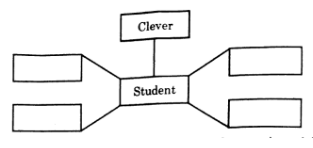
View Solution
 Quick Tip: In such diagrams, related words are placed near each other with arrows showing the connection or relationship.
Quick Tip: In such diagrams, related words are placed near each other with arrows showing the connection or relationship.
Make a meaningful sentence by using the phrase to be afraid of.
View Solution
I am afraid of the dark. Quick Tip: When making a sentence with the phrase to be afraid of, think of things that people may fear and try to incorporate them into your sentence.
Add a clause to the following sentence to expand meaningfully:
This is a classroom.
View Solution
This is a classroom where students learn and teachers teach. Quick Tip: To expand a sentence, add descriptive clauses that provide more information about the subject or the action.
manage
View Solution
Unmanage, manageable, management. Quick Tip: To form new words, think about the meaning you want to convey and add an appropriate prefix or suffix.
kind
View Solution
Unkind, kindness. Quick Tip: Prefixes like "un-" can negate the meaning, while suffixes like "-ness" can turn an adjective into a noun.
manage
View Solution
She learned how to manage her time effectively. Quick Tip: When making a meaningful sentence, try to provide context or a situation where the word fits naturally.
kind
View Solution
He was very kind to help me with my homework. Quick Tip: To make a meaningful sentence, consider the qualities or actions related to the word and how they fit into a situation.
The sight of the food maddened him.
View Solution
True.
The passage states, "The sight of the food maddened him." Quick Tip: Read carefully for key phrases in the passage that directly reference the statements.
He pretended to be falling asleep.
View Solution
True.
The passage mentions, "he closed one eye, then the other, and pretended to be falling asleep." Quick Tip: Look for verbs like "pretended" in the passage that directly relate to the statement.
The mother ate a piece of fish that lay at her feet.
View Solution
True.
The passage clearly states, "Now and again, she tore at a piece of fish that lay at her feet." Quick Tip: Check for details in the text about actions that involve the subject (the mother) directly.
The sun was now descending the sky.
View Solution
False.
The passage states, "The sun was now ascending the sky," not descending. Quick Tip: Pay attention to the exact wording in the passage to spot any contradictions.
The sun was now ascending the sky, blazing on his ledge that faced the south. He felt the heat because he had not eaten since the previous nightfall.
He stepped slowly out to the brink of the ledge, and, standing on one leg with the other leg hidden under his wing, he closed one eye, then the other, and pretended to be falling asleep. Still, they took no notice of him. He saw his two brothers and his sister lying on the plateau dozing with their heads sunk into their necks. His father was preening the feathers on his white back. Only his mother was looking at him. She was standing on a little high hump on the plateau, her white breast thrust forward. Now and again, she tore at a piece of fish that lay at her feet and then scraped each side of her beak on the rock. How he loved to tear food that way, scraping his beak now and again to whet it.
Question 21:
Complete the web:

View Solution
His father: Preening feathers, no notice of him, continuing to relax.
His mother: Watching him, tearing at a piece of fish, scraping her beak.
His brothers and sister: Lying on the plateau, dozing, with heads sunk into their necks.
He/his: Pretending to fall asleep, stepping out to the brink of the ledge, watching his family. Quick Tip: To complete the web, focus on the key actions described in the passage for each family member and write down these specific actions.
Match the words in column 'A' with their meanings in column 'B':
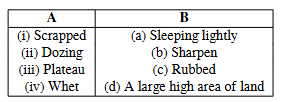
View Solution
 Quick Tip: Match each word in column 'A' with its closest definition or synonym in column 'B' to complete the exercise.
Quick Tip: Match each word in column 'A' with its closest definition or synonym in column 'B' to complete the exercise.
The sight of the food maddened him.
(Add a 'question tag')
View Solution
The sight of the food maddened him, didn't it? Quick Tip: For question tags, focus on the auxiliary verb used in the sentence. If the statement is positive, the question tag will be negative, and vice versa.
Only his mother was looking at him.
(Rewrite the sentence in present perfect tense)
View Solution
Only his mother has been looking at him. Quick Tip: To rewrite a sentence in present perfect tense, use "has" or "have" with the past participle of the verb.
Personal Response:
Write any four good things that your parents taught you.
View Solution
Always be honest.
Treat others with respect.
Work hard and never give up.
Always be kind to animals. Quick Tip: For personal response questions, reflect on the important lessons or values your parents have taught you and express them clearly.
Who said to whom?

View Solution
 Quick Tip: Focus on the speaker's dialogue and the context in the passage to match the speaker and the listener.
Quick Tip: Focus on the speaker's dialogue and the context in the passage to match the speaker and the listener.
Twenty years ago, in the foothills of the Himalayas, I met a small, skinny child labourer. He asked me: “Is the world so poor that it cannot give me a toy and a book, instead of forcing me to take a gun or a tool?”
I met with a Sudanese child-soldier. He was kidnapped by an extremist militia. As his first training lesson, he was forced to kill his friends and family. He asked me: “What is my fault?”
Friends, all the great religions teach us to care for our children. Jesus said: “Let the children come to me; do not hinder them, for the kingdom of God belongs to them.” The Holy Quran says: “Kill not your children because of poverty.”
Friends! There is no greater violence than to deny the dreams of our children. Therefore, I refuse to accept that all the temples and mosques and churches and prayer houses have no place for the dreams of our children.
I refuse to accept that the world is so poor, when just one week of global military expenditure can bring all the children to classrooms.
Question 27:Complete the web:
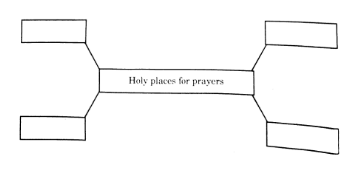
View Solution
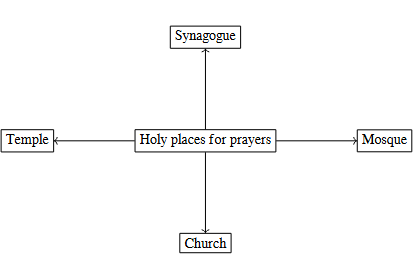
Quick Tip: Think about the places where people of different religions come together to pray. Each religion has its own specific holy places.
week
View Solution
The describing word for week is: global. Quick Tip: Look for adjectives or descriptive phrases that explain or add detail to the noun in question.
Quran
View Solution
The describing word for Quran is: Holy. Quick Tip: Check for words that characterize or give further meaning to the noun, especially in religious or formal contexts.
violence
View Solution
The describing word for violence is: greater. Quick Tip: Describing words for abstract nouns often indicate the level, extent, or nature of the concept.
religions
View Solution
The describing word for religions is: great. Quick Tip: Look for words that show the importance, size, or significance of the noun, often used to emphasize respect or reverence.
He asked me, “What is my fault?”
View Solution
The correct indirect speech is: He asked me what his fault was. Quick Tip: When converting direct speech to indirect speech, make sure to change the pronouns and adjust the tense accordingly.
He was forced to kill his friends and family.
(Rewrite the sentence and underline the infinitive)
View Solution
The sentence rewritten with the infinitive underlined is: He was forced to kill his friends and family. Quick Tip: In sentences with a verb indicating compulsion or necessity, the infinitive form of the verb typically follows after words like 'forced', 'compelled', etc.
Personal Response:
What will you do if you find a poor and needy child? Explain.
View Solution
If I find a poor and needy child, my first step would be to assess their immediate needs. I would ensure that the child is safe, healthy, and not in any danger. If the child is hungry, I would offer food or water, depending on what is available. After addressing their basic needs, I would try to comfort the child by talking to them and gaining their trust.
Next, I would try to gather information about the child's situation. If the child is lost or separated from their family, I would take steps to locate the child's parents or guardians. If the child has no family or is in a distressing situation, I would consider reaching out to local social services or child welfare organizations. These organizations have the resources to provide longer-term support, such as shelter, education, medical care, and counseling, which would be necessary for the child's well-being.
Additionally, I would try to connect the child with any nearby shelters or charities that focus on assisting children in need. If the child is from a marginalized or impoverished community, I would also consider raising awareness in my own community to help support similar children. By promoting the importance of social responsibility and encouraging others to contribute to the welfare of children in need, we can create a more compassionate environment for them to grow up in.
Finally, I would ensure that any legal steps, such as contacting law enforcement or child protection services, are taken if necessary to ensure the safety and security of the child. Quick Tip: When responding to questions about helping others, especially in a vulnerable position, consider all the practical and emotional support you can provide. Always prioritize safety and well-being.
The poet saw a lovely girl on ____________.
View Solution
The complete sentence is: The poet saw a lovely girl on the bus. Quick Tip: To complete sentences, consider the context and choose a word that fits both grammatically and logically. In this case, a location or place is required.
The poet stopped to buy ____________.
View Solution
The complete sentence is: The poet stopped to buy some sweets. Quick Tip: Pay attention to the action described. In this case, the poet is performing an action related to purchasing something.
The poet requests ____________ to forgive him.
View Solution
The complete sentence is: The poet requests God to forgive him. Quick Tip: Look for a subject and object that fit the sentence context. Here, "God" makes the most sense, given the poetic reference to prayer or asking for forgiveness.
The lovely girl in a bus wore ____________.
View Solution
The complete sentence is: The lovely girl in a bus wore a crutch. Quick Tip: In sentences like this, focus on the descriptive elements of the scene. The girl is described with physical features, so choose words that describe a visible object.
Today on a bus, I saw a lovely girl with silken hair
I envied her, she seemed so gay, and I wished I was so fair
When suddenly she rose to leave, I saw her hobble down the aisle
She had one leg and wore a crutch, but as she passed - a smile
O God, forgive me when I whine
I have two legs, the world is mine.
And then I stopped to buy some sweets, The lad who sold them had such charm
I talked with him, he seemed so calm, and if I were late, it would do no harm,
And as I left he said to me "I thank you, you have been so kind"
It's nice to talk with folks like you. You see, I'm blind
O God forgive me when I whine
I have two eyes, the world is mine
Complete the web:
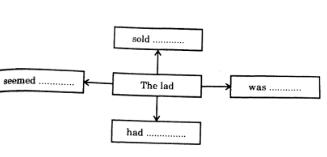
View Solution
The lad had charm
The lad sold sweets
The lad seemed gay
The lad was fair Quick Tip: To complete webs like this, focus on identifying relationships between words. The words in the poem provide context for how they relate to each other.
Write any two pairs of rhyming words from the stanzas.
View Solution
fair and hair
whine and mine Quick Tip: Rhyming words typically have similar ending sounds. Look for words in the stanzas that end with the same or similar sounds.
Appreciation of the Poem:
Read the following poem and write an appreciation of it with the help of the points given below:
You Start Dying Slowly...
If you do not travel,
If you do not read,
If you do not listen to the sounds of life,
If you do not appreciate yourself.
You start dying slowly....
When you kill your self-esteem,
When you do not let others help you.
You start dying slowly....
If you become a slave of your habits,
Walking everyday on the same paths.....
If you do not change your routine,
If you do not wear different colours
Or you do not speak to those you don't know.
You start dying slowly...
If you avoid to feel passion
And their turbulent emotions;
Those which make your eyes glisten
And your heart beat fast.
You start dying slowly....
If you do not change your life
when you are not satisfied with your job,
or with your love,
If you do not risk what is safe, for the uncertain,
If you do not go after a dream,
If you do not allow yourself,
At least once in your lifetime,
To run away from sensible advice......
-- Pablo Neruda
View Solution
Title: You Start Dying Slowly
The title highlights the central theme of the poem: the gradual death that occurs when one neglects the true essence of life. It suggests that without engaging with life meaningfully, one begins to lose their vitality in a metaphorical sense.
Name of the Poet: Pablo Neruda
Pablo Neruda was a famous Chilean poet known for his passionate and reflective poetry that often explored themes of love, nature, and human condition.
Rhyme Scheme: The poem does not follow a strict rhyme scheme, making it more reflective and open. The lines are short and impactful, which enhances the emotional tone.
Figure of Speech: Metaphor
The main figure of speech used in the poem is metaphor. The phrase "You start dying slowly" is a metaphor for emotional and spiritual decay when someone fails to engage with life. The metaphor helps convey the urgency of the poem’s message.
Theme/Central Idea:
The theme of the poem is a warning against complacency in life. The central idea is that when one stops embracing life fully—through travel, reading, self-appreciation, and connecting with others—they begin to metaphorically die. The poem calls for the importance of living with passion and purpose to avoid this slow decline. Quick Tip: When appreciating a poem, focus on the message conveyed by the poet. Identify the central theme and think about how the poet uses language, tone, and figures of speech to communicate that message.
Kalam earned a degree in ____________ engineering.
View Solution
Kalam earned a degree in aeronautical engineering. Quick Tip: When stating degrees or qualifications, ensure the subject is specified clearly, such as "aeronautical engineering."
DRDO stands for ____________.
View Solution
DRDO stands for Defence Research and Development Organisation. Quick Tip: Acronyms like DRDO should be spelled out fully at least once, with the acronym in parentheses.
Kalam was ____________ of the SLV-III, the first satellite launch vehicle.
View Solution
Kalam was the project director of the SLV-III, the first satellite launch vehicle. Quick Tip: When referring to someone's role in a project or initiative, ensure that the title or role is described accurately.
Kalam served as lecturer at ____________.
View Solution
Kalam served as lecturer at several universities. Quick Tip: When mentioning someone's career role, such as being a lecturer, specify the institution or type of institution.
A.P.J. Abdul Kalam, in full Avul Pakir Jainulabdeen Abdul Kalam, (bor died July 27, 2015, Shillong), India October 15, 1931, Rameshwaram, India - scientist who played a leading role in the development of India's missile and nuclear weapons programmes. He was President of India from 2002 to 2007, Kalam earned a degree in aeronautical engineering from the Madras Institute of Technology and in 1958 joined the Defence Research and Development Organisation (DRDO). In 1969, he moved to the Indian Space Research Organisation, where he was project director of the SLV-III, the first satellite launch vehicle that was both designed and produced in India. Rejoining DRDO in 1982, Kalam planned the programme that produced a number successful missiles, which helped earn him the nickname "Missile Man". Among those successes was Agni, India's first intermediate-range ballistic missile, which incorporated aspects of the SLV-III and was launched in 1989. Kalam remained committed using science and technology to transform Ind into a developed country and served as lecturer at several universities. Kala 13/N 581
wrote several books, including an autobiography, Wings of Fire (1999). He received the Padma Bhushan (1981), Padma Vibhushan (1990), Indira Gandhi award for National Integration (1997) and the India's highest civilian award Bharat Ratna (1997).
Question 46:
Complete the web diagram:
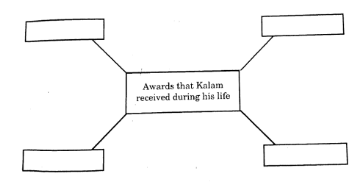
View Solution
The web diagram can be completed with the following awards that Kalam received during his life:
Padma Bhushan (1981)
Padma Vibhushan (1990)
Bharat Ratna (1997)
Indira Gandhi Award for National Integration (1997) Quick Tip: When filling out a web diagram, ensure each category is covered clearly and concisely.
Mr. Gunaji has ____________ a Principal in this college.
View Solution
Mr. Gunaji has served as a Principal in this college. Quick Tip: When filling in the blanks, ensure the chosen word or phrase fits both the context and grammar of the sentence.
The Story of My Experiments with Truth is the ____________ of Mahatma Gandhi.
View Solution
The Story of My Experiments with Truth is the autobiography of Mahatma Gandhi. Quick Tip: Autobiographies are books written by individuals about their own lives.
My teacher ____________ to England for further studies.
View Solution
My teacher moved to England for further studies. Quick Tip: When using "moved," it indicates a change of location, often implying a permanent or semi-permanent shift.
ISRO successfully ____________ the Chandrayaan-3 mission.
View Solution
ISRO successfully launched the Chandrayaan-3 mission. Quick Tip: "Launch" refers to the official beginning of a project or mission, often associated with space exploration.
Kalam wrote ____________ books.
(Frame a Wh-type question to get the underlined part as answer)
View Solution
What did Kalam write? Quick Tip: When framing a question, the Wh-word should be chosen based on the part of the sentence you want to inquire about. In this case, "What" is used because we are asking about the object (the books).
Kalam earned a degree in aeronautical engineering.
(Begin the sentence with "A degree in ____________...")
View Solution
A degree in aeronautical engineering was earned by Kalam. Quick Tip: When rephrasing a sentence, ensure to maintain the original meaning while changing the structure as directed.
Summary Writing:
Read the passage given in Q. No. 4(A) and write a summary of it. Suggest a suitable title to the summary.
View Solution
Dr. A.P.J. Abdul Kalam, a renowned scientist, played a significant role in India's missile and space programs. He earned a degree in aeronautical engineering and contributed to the development of the SLV-III. Kalam also received numerous awards, including the Padma Bhushan, Padma Vibhushan, and Bharat Ratna. He served as the President of India from 2002 to 2007 and remained committed to using science and technology to transform India. His life exemplifies dedication, leadership, and a passion for scientific progress.
A suitable title for the summary could be The Achievements of Kalam. Quick Tip: When writing a summary, focus on the core ideas and avoid including specific examples or minor details. Choose a title that accurately reflects the main theme of the summary.
Informal Letter:
Write a letter to your friend who is not doing well in English. Advise him/her to study well. Make use of the points given in the poster. Add your own points.
View Solution
47 Raman Baugh,
Satara.
Date: [Insert Date]
Dear [Friend's Name],
I hope you are doing well. I noticed that you're having some trouble with English, and I thought I'd write to offer some advice. English can be a bit tricky, but with a few simple changes, you can improve your skills.
First, I suggest that you read more books, newspapers, and poetry aloud. This will help you improve both your reading skills and pronunciation. Don’t hesitate to look up new words in the dictionary and try to use them in your daily conversations. Speaking with friends and teachers in English, even in simple conversations, will make a big difference.
Also, make sure to jot down your thoughts in English regularly. By writing about your day or anything you feel, you'll get better at forming sentences and using new vocabulary. Lastly, don't forget to review what you have learned every day. Consistency is key!
Take care, and I know you'll do well if you keep at it.
Best regards,
[Your Name] Quick Tip: When writing informal letters, keep the tone friendly and personal. Include suggestions or advice that is practical and encouraging.
Formal Letter:
Write a letter to The Club Incharge, English Club, Satara, thanking him for giving the poster of 'Developing Writing Skills'. Also, assure him the tips and guidance in the poster are useful to every English learner. Add your own points.
View Solution
N/A Quick Tip: In formal letters, use a respectful tone and ensure that your language is polite and professional. Don't forget to include the date and subject when writing a formal letter.
Dialogue Writing/Drafting a Speech:
B1 or B2. Do any one of the following:
B1. Dialogue Writing:
View Solution
In this solution, we will prepare a dialogue from the given jumbled sentences and expand the conversation into multiple exchanges.
Person 1: Have you participated in any cultural event?
Person 2: Yes, I have participated in a group dance event.
Person 1: Which song did you select?
Person 2: I selected a Punjabi folk song.
Person 1: What are your hobbies?
Person 2: I love reading books and painting.
Person 1: What kind of books do you read?
Person 2: I enjoy reading mystery novels and thrillers.
Person 1: Have you ever traveled to any international destinations?
Person 2: Yes, I visited Italy last summer.
Person 1: That sounds amazing! What places did you visit there?
Person 2: I visited Rome, Venice, and Florence.
Person 1: What’s your favorite cuisine?
Person 2: I really enjoy Italian food.
Person 1: Oh, I love Italian food too! What’s your favorite dish?
Person 2: I love eating pasta, especially spaghetti.
Person 1: Have you seen any good movies lately?
Person 2: Yes, I watched a really good action movie yesterday.
Person 1: What was the movie about?
Person 2: It was about a secret agent who saves the world from a terrorist group.
Person 1: How is your study going?
Person 2: It’s going well, but I have a lot of assignments to complete.
Person 1: What subject are you struggling with?
Person 2: I am having difficulty with mathematics, especially algebra.
Person 1: How’s the weather today?
Person 2: It’s very hot today.
Person 1: Are you planning to go out?
Person 2: No, I think I’ll stay indoors and relax.
Person 1: Do you play any sports?
Person 2: Yes, I play football on the weekends.
Person 1: That’s great! How long have you been playing?
Person 2: I have been playing football since I was in school.
Person 1: Have you read any good books recently?
Person 2: Yes, I read a fantastic historical fiction novel last week.
Person 1: What was it about?
Person 2: It was about the French Revolution and the lives of the people involved.
Person 1: What are your plans for the weekend?
Person 2: I’m planning to go hiking in the mountains with my friends.
Person 1: That sounds fun! How long will you be hiking?
Person 2: We’ll be hiking for about 4-5 hours.
Quick Tip: When creating dialogues from jumbled sentences, it’s important to create a logical and natural flow of conversation. First, establish a general question, and then let the conversation move to specific details. Also, use the conversational style to make it sound realistic.
Complete the Dialogue:
Mohan: Do you like to watch movies?
Sohan: .................................
Mohan: Which is your favourite movie?
Sohan: ..................................
View Solution
Mohan: Do you like to watch movies?
Sohan: Yes, I love watching movies, especially action and thriller genres.
Mohan: Which is your favourite movie?
Sohan: My favourite movie is "The Dark Knight," as I really admire the storyline and characters.
Mohan: That’s a great choice! I love that movie too.
Mohan: Do you like to watch movies?
Sohan: Yes, I enjoy them a lot, especially comedies.
Mohan: Which is your favourite movie?
Sohan: My favourite movie is "The Hangover." It always makes me laugh!
Mohan: Oh, that's hilarious! I need to watch it again.
Mohan: Do you like to watch movies?
Sohan: Yes, but I prefer documentaries more than movies.
Mohan: Which is your favourite movie?
Sohan: I don’t watch many movies, but I really liked "The Social Dilemma."
Mohan: That was such an eye-opener! It really made me think about social media.
Mohan: Do you like to watch movies?
Sohan: Yes, I do! I love watching animated movies.
Mohan: Which is your favourite movie?
Sohan: My favourite movie is "Toy Story 3." It’s such an emotional movie.
Mohan: I agree! It really touches the heart.
Mohan: Do you like to watch movies?
Sohan: Yes, especially sci-fi movies!
Mohan: Which is your favourite movie?
Sohan: My favourite movie is "Inception." I love the mind-bending plot.
Mohan: That’s an amazing movie! The concept is brilliant.
Quick Tip: When completing dialogues, focus on creating a natural flow. Make sure each response logically follows the previous one and adds to the conversation.
Write a Dialogue Between Ganesh and Mahesh Having Three Meaningful Exchanges on "The Benefits of Morning Walk."
View Solution
Ganesh: Good morning, Mahesh! I was just thinking about how refreshing morning walks can be.
Mahesh: Yes, Ganesh! Morning walks help in improving our overall health, keeping us fit and energetic throughout the day.
Ganesh: Absolutely! I’ve also noticed that it helps clear my mind and boosts my mood. It’s a great way to start the day!
Ganesh: Have you been going for morning walks lately?
Mahesh: Yes, I have. I find that it helps with my digestion and gives me more energy for the day.
Ganesh: That’s great! I’ve also heard it’s good for heart health. I should start doing it more regularly.
Ganesh: I’ve been feeling so tired lately. Do you think a morning walk could help?
Mahesh: Definitely! It boosts your metabolism and helps you feel more awake.
Ganesh: Sounds perfect! I’ll try it tomorrow morning.
Ganesh: Mahesh, do you know the benefits of morning walks?
Mahesh: Yes! They help reduce stress and improve mental clarity. I always feel calm after a walk.
Ganesh: That’s exactly what I need! I should try walking in the mornings.
Ganesh: I’ve been reading about the benefits of morning walks. Do you walk every day?
Mahesh: Yes, I walk every morning. It’s great for overall fitness and helps me stay active.
Ganesh: That’s inspiring! I think I should join you tomorrow for a walk.
Quick Tip: When writing a dialogue, focus on making each exchange meaningful and relevant to the topic. Use simple language, and ensure that the characters are contributing equally to the conversation.
Speech Writing:
You are going to participate in an Elocution competition arranged by your school on "Living a better life." Write a speech on the given topic with the help of the following points:
Get rid of bad habits.
Be positive.
Avoid negative thoughts.
Trust yourself.
Try to enrich your mind by becoming a lifelong learner.
Sharing and caring makes life enjoyable.
Be humble, respect, and welcome each day with a smile.
View Solution
Speech on "Living a Better Life"
Good morning to everyone present here, respected judges, teachers, and my dear friends. I am honored to stand before you today and speak on the topic "Living a Better Life."
Living a better life is something that we all aspire to, but achieving it requires conscious effort and a positive approach. The first step to living a better life is to get rid of bad habits. Habits shape our lives, and it is essential to replace negative habits with positive ones. Whether it's procrastination, smoking, or unhealthy eating, we must work towards eliminating them.
Next, we must focus on being positive. Life is full of challenges, but maintaining a positive attitude helps us face those challenges with confidence. A positive mindset can make all the difference, whether in overcoming personal struggles or achieving success.
One key aspect of positivity is avoiding negative thoughts. Negative thinking can hinder our progress and diminish our self-worth. Instead, we should focus on what is good in our lives, appreciate the little moments, and move forward with hope and determination.
Trusting ourselves is another important factor in living a better life. We all have the potential to achieve great things, and the first step is to believe in ourselves. Confidence in our abilities and decisions empowers us to take bold steps toward our goals.
It is also essential to enrich our minds by becoming lifelong learners. Knowledge and growth never stop, and there is always something new to learn. Whether through formal education, reading, or life experiences, we must continue to expand our minds and embrace new ideas.
Another important aspect of a fulfilling life is sharing and caring for others. Life is not just about personal success; it’s also about building relationships and helping those around us. A caring attitude not only helps others but also enriches our own lives.
Lastly, we must approach every day with humility and a smile. Life is a gift, and by respecting ourselves and others, we can make each day meaningful. Welcoming each day with a smile, no matter the challenges, sets the tone for a positive and productive day ahead.
In conclusion, living a better life is not an overnight achievement, but a continuous journey. By getting rid of bad habits, being positive, avoiding negative thoughts, trusting ourselves, learning continuously, caring for others, and embracing each day with humility and joy, we can live a life that is not only better for ourselves but also for those around us.
Thank you! Quick Tip: When writing a speech, remember to organize your thoughts logically. Start with an introduction, followed by the main points, and finish with a strong conclusion. Use a confident and positive tone to engage your audience.
Non-verbal to Verbal:
Read the information given in the following tree-diagram and write two short paragraphs based on it. Give a suitable title to your write-up.
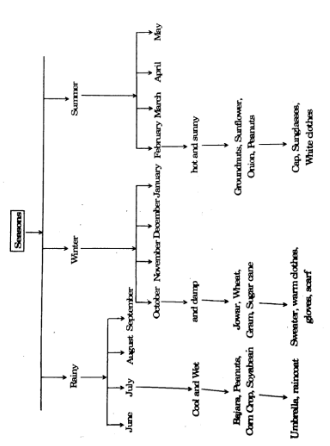
View Solution
Title: Seasons and Their Characteristics
India experiences three major seasons: Summer, Winter, and Rainy. During the summer months, which span from March to June, the weather is hot and dry. May is the hottest month, and it is a time when people wear light clothes like white cotton garments and use sunshades and caps to protect themselves from the sun. In contrast, during the winter months from December to February, the weather is cool and dry, and people often wear warm clothes to stay comfortable.
The rainy season starts from June to September, with July being the peak month. The weather is cool and wet, and there is heavy rainfall during this period. This is the time when people experience a lot of humidity. In agriculture, crops such as rice, wheat, and sugarcane are harvested during this season. Quick Tip: When transferring information from a tree diagram to verbal form, make sure to connect the ideas logically. Group similar pieces of information together to make the paragraph flow smoothly.
Complete the following table:
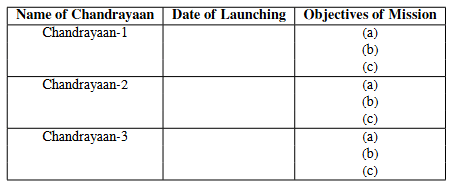
View Solution
Title: Chandrayaan Missions Overview
 Quick Tip: When transferring information from verbal form to a table, ensure that you group similar pieces of information under clear headings. This helps in making the table more readable and organized.
Quick Tip: When transferring information from verbal form to a table, ensure that you group similar pieces of information under clear headings. This helps in making the table more readable and organized.
News Report:
Read the following headline and prepare a news report with the help of the given points:
Headline: New Vision School celebrated Yoga Day
Headline
Date-line
Introduction
Short continuing paragraph
View Solution
Headline:
New Vision School celebrated Yoga Day with enthusiasm and participation from all students.
Date-line:
Date: 21st June 2025, Location: New Vision School, City Name
Introduction:
In a grand event held on the 21st of June, New Vision School organized a Yoga Day celebration that saw active participation from both students and staff. The event was held to promote the importance of physical fitness and mental well-being. Yoga experts were invited to guide the participants in performing various asanas.
Short Continuing Paragraph:
The celebration began early in the morning with a session of basic yoga postures, which was followed by breathing exercises aimed at enhancing concentration and calmness. The event was conducted in the school’s playground, where students were divided into different groups based on age and skill levels. Teachers also took part, demonstrating their commitment to wellness. The event concluded with a discussion on the benefits of yoga and how it contributes to a balanced lifestyle. Students expressed their enthusiasm and promised to practice yoga regularly as part of their daily routine. Quick Tip: When writing a news report, ensure that the headline is catchy and concise. Use the date-line to specify when and where the event took place. In the introduction, give the most important details, and use the short continuing paragraph to elaborate on the events in a coherent, flowing manner.
Develop a story with the help of the given beginning. Suggest a suitable title.
Once I was alone at my home. My parents had gone to another village.
...........................................
......................................................
.......................................................
..................................
View Solution
Title: The Unexpected Visitor
Once I was alone at my home. My parents had gone to another village for a wedding, and I was left to take care of the house. At first, I was excited about the idea of spending time alone, with no one to disturb me. I decided to enjoy the peace and quiet and catch up on my reading and hobbies.
The first few hours passed by quickly. I was deeply immersed in a book when suddenly, I heard a knock at the door. I wasn’t expecting anyone, and curiosity struck me. I slowly walked towards the door and peeked through the peephole. To my surprise, there was no one standing outside.
I opened the door cautiously and looked around the yard. Nothing seemed unusual, but I couldn’t shake off the feeling that something strange was happening. As I closed the door, I heard a soft rustling noise coming from the backyard. Hesitant, I decided to investigate.
To my amazement, I found a small, lost puppy in the yard. It was wagging its tail and looking up at me with pleading eyes. I knew immediately that I had to take it in. I fed the puppy and played with it for a while, not realizing how quickly the time had passed.
By the time my parents returned home, the puppy had become an inseparable part of my life. They were surprised to find me with a new companion, but they were happy to see how much joy the little puppy had brought into our home. Quick Tip: When writing a story, start with a simple beginning, and then let your imagination guide you through the events. Add details that make the story engaging, and give it a satisfying conclusion. Don’t forget to make the characters and situations relatable.
Competition
View Solution
"Competition" का हिंदी में अनुवाद: प्रतियोगिता Quick Tip: Competition refers to a contest or challenge between individuals or teams.
Humanity
View Solution
“Humanity” का हिंदी में अनुवाद: मानवता Quick Tip: Humanity refers to the quality of being human or kind-hearted.
Courage
View Solution
“Courage” का हिंदी में अनुवाद: साहस Quick Tip: Courage refers to the ability to face fear or adversity with strength.
Prayer
View Solution
“Prayer” का हिंदी में अनुवाद: प्रार्थना Quick Tip: Prayer refers to the act of communicating with a deity or higher power.
Great
View Solution
“Great” का हिंदी में अनुवाद: महान Quick Tip: Great refers to something of exceptional quality, magnitude, or importance.
Dust
View Solution
“Dust” का हिंदी में अनुवाद: धूल Quick Tip: Dust refers to small particles of matter, often fine and lightweight.
Remove your shoes outside the library.
View Solution
“Remove your shoes outside the library.” का हिंदी में अनुवाद: पुस्तकालय के बाहर अपने जूते निकालें। Quick Tip: This sentence refers to the action of removing shoes before entering a library.
Don’t tear the pages of books.
View Solution
“Don’t tear the pages of books.” का हिंदी में अनुवाद: पुस्तकों के पन्ने न फाड़ें। Quick Tip: This sentence advises not to damage or tear the pages of books.
Keep silence in the library.
View Solution
“Keep silence in the library.” का हिंदी में अनुवाद: पुस्तकालय में शांति बनाए रखें। Quick Tip: This sentence suggests maintaining silence in the library.
Return the books within one week.
View Solution
“Return the books within one week.” का हिंदी में अनुवाद: एक सप्ताह के भीतर पुस्तकों को वापस करें। Quick Tip: This sentence instructs to return the books within a week.
A friend in need is a friend indeed.
View Solution
“A friend in need is a friend indeed.” का हिंदी में अनुवाद: जो मित्र आवश्यकता में काम आए वही सच्चा मित्र होता है। Quick Tip: This proverb means that a true friend is one who helps in times of trouble.
It takes two to quarrel.
View Solution
“It takes two to quarrel.” का हिंदी में अनुवाद: झगड़ा करने के लिए दो लोग चाहिए। Quick Tip: This proverb suggests that both parties are responsible for a quarrel or conflict.



Comments